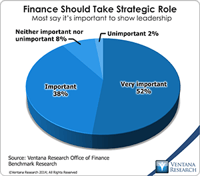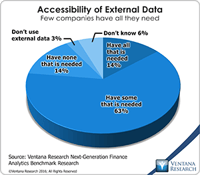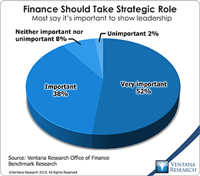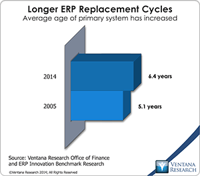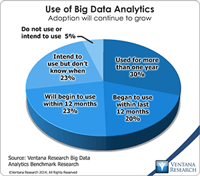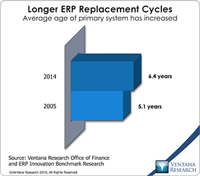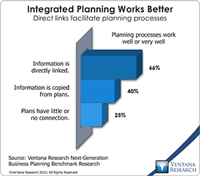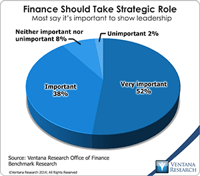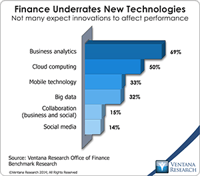Like many other industry observers I’ve heard overblown claims for information technology for decades. However, I’ve also observed that – eventually – reality catches up with vision. Finance and accounting departments are particularly resistant to change, yet because almost no corporations use adding machines or typewriters any more, it’s clear that transformative change can happen. Nonetheless, because users of business computing systems are inundated with “it’s better than ever” promotions by...
Read More
Topics:
Social Media,
Mobile Technology,
Office of Finance,
Operational Performance Management (OPM),
Human Capital,
Business Analytics,
Business Collaboration,
Business Intelligence,
Cloud Computing,
Business Performance Management (BPM),
Customer Performance Management (CPM),
Financial Performance Management (FPM),
Supply Chain Performance Management (SCPM)
Using information technology to make data useful is as old as the Information Age. The difference today is that the volume and variety of available data has grown enormously. Big data gets almost all of the attention, but there’s also cryptic data. Both are difficult to harness using basic tools and require new technology to help organizations glean actionable information from the large and chaotic mass of data. “Big data” refers to extremely large data sets that may be analyzed computationally...
Read More
Topics:
Big Data,
Data Science,
Planning,
Predictive Analytics,
Social Media,
FP&A,
Office of Finance,
Operational Performance Management (OPM),
Budgeting,
Connotate,
cryptic,
equity research,
Finance Analytics,
Human Capital,
Kofax,
Statistics,
Analytics,
Business Analytics,
Business Intelligence,
Customer Performance Management (CPM),
Data,
Datawatch,
Financial Performance Management (FPM),
Kapow,
Sales Performance Management (SPM),
Supply Chain Performance Management (SCPM),
Strata+Hadoop
The imperative to transform the finance department to function in a more strategic, forward-looking and action-oriented fashion has been a consistent theme of practitioners, consultants and business journalists for two decades. In all that time, however, most finance and accounting departments have not changed much. In our benchmark research on the Office of Finance, nine out of 10 participants said that it’s important or very important for finance departments totake a strategic role in running...
Read More
Topics:
Big Data,
Planning,
Predictive Analytics,
Social Media,
Governance,
GRC,
Mobile Technology,
Office of Finance,
Budgeting,
close,
Continuous Accounting,
Continuous Planning,
end-to-end,
Human Capital,
Tax,
Analytics,
Business Analytics,
Business Collaboration,
CIO,
Cloud Computing,
In-memory,
Uncategorized,
Business Performance Management (BPM),
CFO,
CPQ,
Financial Performance Management (FPM),
Risk,
CEO,
Financial Performance Management,
FPM
The enterprise resource planning (ERP) system is a pillar of nearly every company’s record-keeping and management of business processes. It is essential to the smooth functioning of the accounting and finance functions. In manufacturing and distribution, ERP also can help plan and manage inventory and logistics. Some companies use it to handle human resources functions such as tracking employees, payroll and related costs. Yet despite their ubiquity, ERP systems have evolved little since their...
Read More
Topics:
Big Data,
Microsoft,
SAP,
Social Media,
ERP,
FP&A,
Mobile Technology,
NetSuite,
Office of Finance,
Operational Performance Management (OPM),
Reporting,
close,
closing,
Controller,
dashboard,
Human Capital,
Reconciliation,
Analytics,
Business Intelligence,
Cloud Computing,
Collaboration,
IBM,
Oracle,
Uncategorized,
Business Performance Management (BPM),
CFO,
Data,
finance,
Financial Performance Management (FPM),
Supply Chain Performance Management (SCPM),
Financial Performance Management,
FPM,
Intacct
Optimization is the application of algorithms to sets of data to guide executives and managers in making the best decisions. It’s a trending topic because using optimization technologies and techniques to better manage a variety of day-to-day business issues is becoming easier. I expect optimization, once the preserve of data scientists and operations research specialists will become mainstream in general purpose business analytics over the next five years.
Read More
Topics:
Big Data,
Performance Management,
Social Media,
Operational Performance Management (OPM),
Analytics,
Business Analytics,
Business Collaboration,
Business Performance Management (BPM),
Customer Performance Management (CPM),
Financial Performance Management (FPM),
Information Management (IM),
Sales Performance Management (SPM),
Supply Chain Performance Management (SCPM),
Price Optimization
Recently, Infor held its second innovation conference with industry analysts at its New York City headquarters. Infor’s products include the major categories of ERP, human capital management and financial performance management applications. Behind the marketing aspects of its use of “innovation” is a business strategy for retaining existing customers, migrating a sizable percentage of those customers to the cloud and gaining new customers. (Because of the relative size of the installed base,...
Read More
Topics:
Social Media,
Office of Finance,
Human Capital,
UX,
Business Analytics,
Business Collaboration,
Cloud Computing,
Business Performance Management (BPM),
Customer Performance Management (CPM),
Financial Performance Management (FPM)
Ventana Research recently released the results of our Next-Generation Business Planning benchmark research. Business planning encompasses all of the forward-looking activities in which companies routinely engage. The research examined 11 of the most common types of enterprise planning: capital, demand, marketing, project, sales and operations, strategic, supply chain and workforce planning, as well as sales forecasting and corporate and IT budgeting. We also aggregated the results to draw...
Read More
Topics:
Big Data,
Planning,
Predictive Analytics,
Sales,
Social Media,
Human Capital Management,
Marketing,
Office of Finance,
Operational Performance Management (OPM),
Reporting,
Budgeting,
Controller,
Business Analytics,
Cloud Computing,
In-memory,
Business Performance Management (BPM),
CFO,
Customer Performance Management (CPM),
Financial Performance Management (FPM),
Sales Performance Management (SPM),
Supply Chain,
Workforce Performance Management (WPM),
capital spending,
demand management,
Financial Performance Management,
financial reporting,
FPM,
Integrated Business Planning,
S&OP
Finance transformation” refers to a longstanding objective: shifting the focus of CFOs and finance departments from transaction processing to more strategic, higher-value functions. Our upcoming Office of Finance benchmark research confirms that most of organizations want their finance department to take a more strategic role in management of the company: nine in 10 participants said that it’s important or very important. (We are using “finance” in its broadest sense, including, for example,...
Read More
Topics:
Big Data,
Mobile,
Performance Management,
Predictive Analytics,
Social Media,
ERP,
FP&A,
Office of Finance,
Reporting,
Management,
close,
closing,
computing,
Controller,
Tax,
Analytics,
Business Analytics,
Business Collaboration,
Cloud Computing,
Collaboration,
Business Performance Management (BPM),
CFO,
finance,
Financial Performance Management (FPM),
Tagetik,
FPM
FinancialForce’s 2014 summer release incorporates improvements in mobile and collaboration features and provides enhancements to the planning dimension of its professional services automation (PSA) suite. In the last couple of releases the company emphasized expansion in the functional capabilities of its ERP suite, as I noted, focusing on human capital management and professional services automation as well as some supply chain automation capabilities.
Read More
Topics:
SaaS,
Sales,
Salesforce.com,
Social Media,
ERP,
HCM,
Human Capital,
Office of Finance,
Consulting,
distribution,
PSA,
Unit4,
Analytics,
Cloud Computing,
Business Performance Management (BPM),
Financial Performance Management (FPM),
FinancialForce,
HR,
Sales Performance Management (SPM),
Professional Services Automation,
SCM
The developed world has an embarrassment of riches when it comes to information technology. Individuals walk around with far more computing power and data storage in their pockets than was required to send men to the moon. People routinely hold on their laps what would have been considered a supercomputer a generation ago. There is a wealth of information available on the Web. And the costs of these information assets are a tiny fraction of what they were decades ago. Consumer products have...
Read More
Topics:
Big Data,
Mobile,
Predictive Analytics,
Social Media,
Customer Experience,
Operational Performance Management (OPM),
Performance,
Analytics,
Business Analytics,
Business Collaboration,
IBM,
Business Performance Management (BPM),
Customer Performance Management (CPM),
finance,
Financial Performance Management (FPM),
Sales Performance Management,
Sales Performance Management (SPM),
Social,
Financial Performance Management,
SPSS
